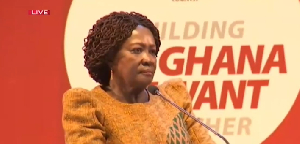Opinions of Tuesday, 14 February 2006
Columnist: GNA
The Paradox of Central Region
A GNA Feature by Hilda Abban
Cape Coast, Feb. 14, GNA - The saying, "poverty in the midst of plenty", clearly defines the fate of the Central Region, which in spite of it being endowed with vast natural resources, is classified the fourth poorest region in Ghana.
It is estimated that five out of every 10 of its population of about 1,580,047, live below the poverty line, with an annual population growth rate of about two per cent, consistently outstripping the rate of decrease in poverty levels.
Ironically, apart from being the citadel of education, with many renowned second cycle institutions, two universities and three teacher training colleges, the Region, also has a vast stretch of coastland which feeds the nation with more than 40 per cent of its total fish requirement and the potential for a booming salt industry.
It can also boast of large tracts of arable land for increased agricultural production, and a vast array of mineral resources like gold, manganese, bauxite and diamond, to the less exploited ones like silicon, mica, feldspar, columbite, tantalite and beryllium, which informatively, can be exploited for industrial purposes, as well as kaolin, the main raw material for the ceramic industry.
The Central Region is also blessed with the potential for the establishment of a variety of agro-processing plants, since it abounds in many fruits and vegetables and food crops.
Also doing the Region proud and expected to help to turn its fortunes around, are the many tourist attractions such as the forts and castles, Kakum National Park, the 'Slave River' at Assin Manso and the vast stretch of beautiful beaches, but which are unfortunately, gradually being eroded, due to the activities of unscrupulous sand winners.
There is also the need to mention the abundance of craftsmen, particularly at Ajumako Owane, whose beautifully carved stools, linguist staffs, and other souvenirs, are an attraction for tourists, as well as batik and tie-dye, which is now produced in many parts of the Region, in beautiful colours and patterns.
During his tenure as the Minister of Trade and Industry, Dr Kofi Konadu Apraku, aptly hit the nail on the head, when in his address during the opening of a trade and investment fair in the Region, stressed that if properly harnessed, the Region's resources could immensely transform its current unenviable socio-economic position, into a rich and vibrant society.
The Deputy Minister, of Private Sector Development and President's Special Initiatives (PSIs), Mr Moses Dani Baah did not also mince words about his dissatisfaction about the current status of the Region, at a stakeholders' forum held at Elmina, sometime last year, by the Central Region Development Commission (CEDECOM), to brainstorm on improving the socio-economic situation in the Region.
The Deputy Minister tasked the participants to help to ensure that the Region's tourism potentials were effectively tapped for accelerated development.
The Former Central Regional Representative on the Council of State and the chief of Assin Kushea, Nana Pra Agyensaim had stressed the need for the establishment of an "Investment Fund" to support various investments.
An idea was also mooted for the formation of a Council of Elders" to deliberate on the Region's well-being, but that seemed to have fizzled out.
During the registration of the underemployed and unemployed, more than 1,500 people, mainly comprising the youth, turned out to be registered for the STEP programme. One is sure that the number which turned out just represents a fraction of the many unemployed youth, who have nothing to do and loiter about from dusk to dawn, and sometimes in obedience to the adage that "the devil finds work for idle hands", find themselves drawn to social vices such as stealing, drug abuse and armed robbery.
In their quest for investment, the District Assemblies in the Region have offered various attractive incentive packages for potential investors, which include easy acquisition of land, exemption from payment of property tax and other local taxes for the first five years of operation and free consultancy services.
In spite of these investors are yet to respond appropriately. The Region continues to be bedevilled with numerous land and chieftaincy disputes. It is, therefore, expected that as custodians of the land and as people who are also committed to the well-being of their subjects, chiefs in the Region, as well as other land owners, would strive hard to help to ensure the quick resolution of all such disputes, as well as stem the greedy practice of the multiple sale of lands, to facilitate the expected development of the Region. It is pertinent to point out, that all residents in the Region, especially its citizens, have an onerous responsibility of ensuring this.
It is also pertinent, to pint out that political affiliation should have no role to play in an important a stake as this, because, poverty, strife and hardships, do not bear party any colours! 14 Feb. 06












